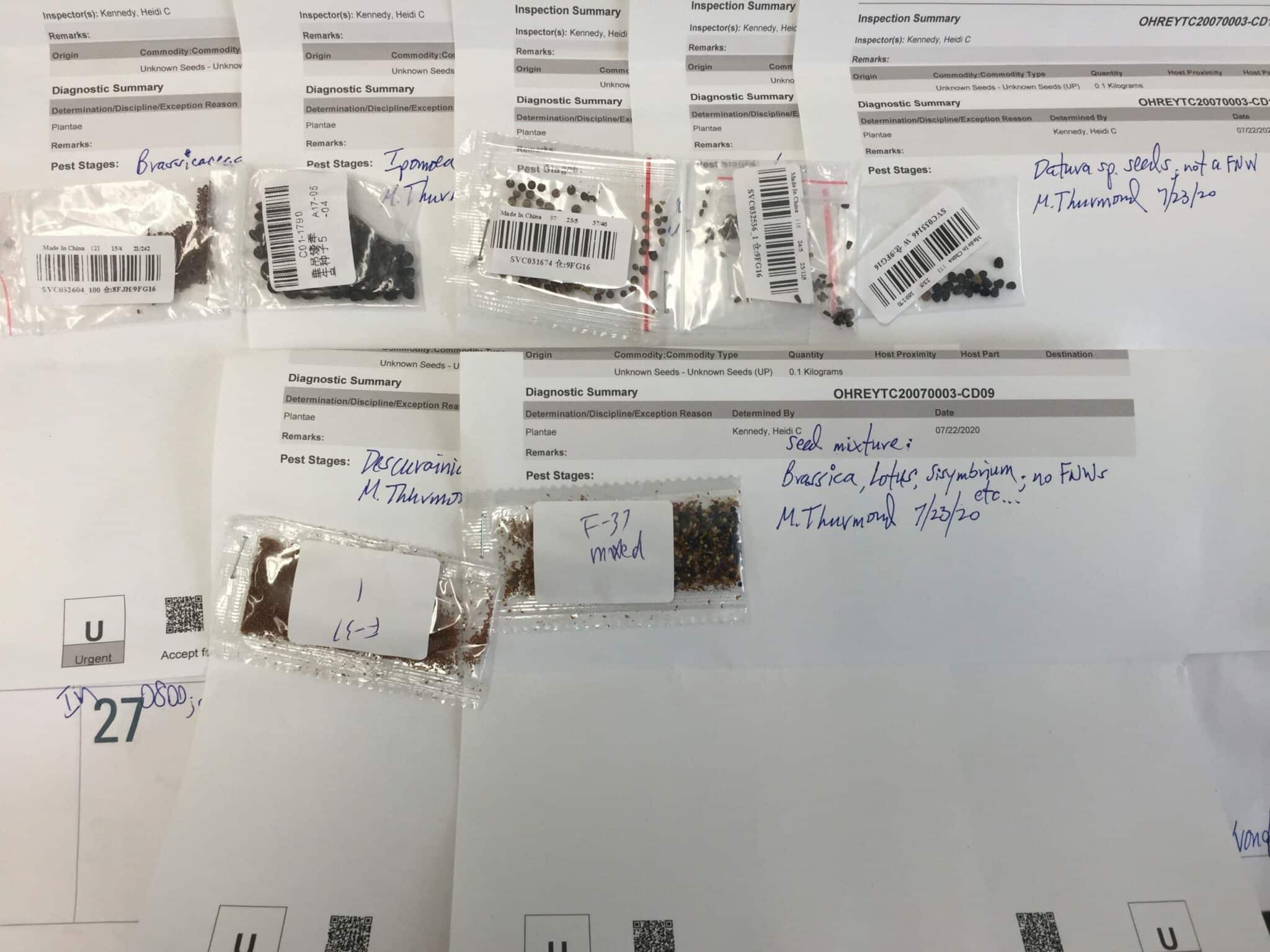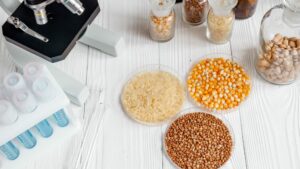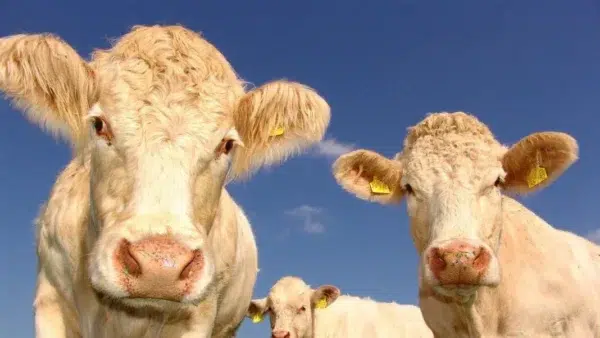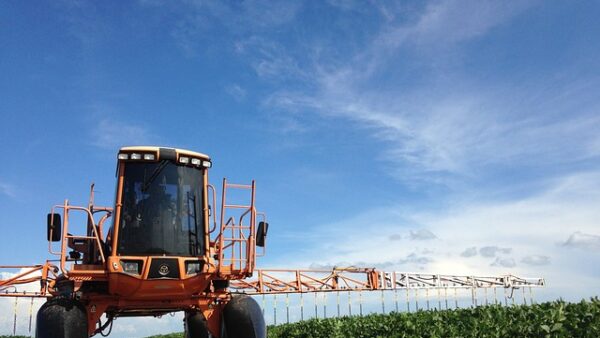As APHIS continues to learn more about the mystery seeds from China, ASTA shares the phytosanitary concerns that have popped up.
In mid-July, the U.S. Department of Agriculture’s Animal and Plant Health Inspection Service (USDA APHIS) noted that mystery seeds were showing up in mailboxes across states from China. Some packages stated they were jewelry, some didn’t have any markings at all except for some Chinese writing on them. APHIS immediately jumped on to the problem to assess the situation — but what have they found that has given them concern?
Seed World sat down with the American Seed Trade Association’s (ASTA) Ric Dunkle, senior director of seed health, to learn more about some of the findings from APHIS.
Seed World (SW): So, this has been a big deal since July! Why did these mystery seeds appearing in mailboxes become such a big deal that APHIS wanted to get involved in it?
Ric Dunkle (RD): Well, initially the issue developed when APHIS noticed there were unsolicited seed packets coming through the mail.
First of all, the internet is a pathway that is easy, unfortunately, to bring anything in illegally. You can bypass all kinds of import requirements if you just do internet sales in general. But in the case of this one, it was seeds.
Seeds are like most other agricultural commodities, they’re highly regulated and they’re highly regulated for a purpose because raw agricultural products in particular — whether it’s seeds or plants or fruit or vegetables — can be a pathway to move unwanted pests and diseases into the United States.
If seed or any other raw agricultural products are left unregulated, then anything can potentially come in. Any pests and diseases that might be on or in these products can be unknowingly released into the environment and cause all kinds of economic and environmental problems. There are many, many, many cases where this has occurred.
It’s known that there are a number of pathogens in particular that can get inside of seeds during production. They’re called seed transmitted pathogens or seedborne pathogens. There can also be contaminants on the seed surfaces and seed that’s been unmitigated, once planted, can then be a vehicle for introducing, establishing and spreading unwanted pests and diseases. There are even some insects that can get inside of seeds as well.
There can be contaminants in a seed shipment as well as weed seed species. A typical example that comes in from Asia, specifically, can be seeds from volunteer plants in a field that are prohibited. So, for example, if you’re growing some variety that’s allowed in from India, but it was grown in a field where there were volunteer plants that were producing rice or corn that is prohibited from India, you can introduce these things and they can have diseases on them that can cause problems. So, APHIS has a legitimate concern about this.
Back in the early 2000s, when I was in charge of APHIS Plant Protection and Quarantine, we set up a program called the Smuggling Interdiction and Trade Compliance Program that was designed to monitor the internet to try to catch entities that were illegally importing plant products.
It’s not a new thing. I think more and more, as the internet becomes more sophisticated, it becomes more difficult to police it as well. When you get this kind of unsolicited activity going on, yeah, it’s a huge potential threat to bring in exotic organisms into the United States illegally.
SW: Are there any other kind of phytosanitary risks that could potentially arise from just having seeds appear?
RD: Sure there is. One of the things that can happen is, even under a controlled scenario, seed producers may grow seed in a foreign country where there also may be prohibited plants such as noxious weed species.
When you harvest that seed, if there are any of those noxious weed plants out in your fields, the noxious weed seeds can also get harvested along with the seed that you’re harvesting. If those seeds look like the seed being harvested, or if they’re about the same size or same color, it can be very difficult to get them all out of the seed. And so, there is always a potential, even under the best scenarios, for noxious weeds to be introduced along with seed consignments. So that’s just one case.
But I’ll give you one case of a pathogen that is bothersome that we found out with this unsolicited seed stuff.
APHIS has been evaluating the seed packets and just tabulating what kind of seeds they are and then what kinds of pests that may be associated with them. One of the pests that they have found is a regulated pest — potato spindle tuber viroid (PSTVd). In this case, APHIS issued a federal order last fall that regulates tomato and pepper seed coming into the United States for PSTVd. This is costing our seed companies millions of dollars to comply with this. And here comes in unsolicited seed.
That pathway can be a much higher threat in many cases to introduce these kinds of things than the regulated pathway, because seed companies are making every effort to produce seed free from all unwanted pests and diseases, as anything that contaminates the seed reduces its purity and overall quality. Their goal is to produce the cleanest material they possibly can free from pests and diseases. That’s why that pathway is so concerning to our industry because these unwanted seeds themselves could be pests. Or they can be they can be carrying regulated pests that we don’t want to have in the United States.
SW: I know ASTA has spoken recently with APHIS for an update of what’s been going on concerning unsolicited seeds. Have there been any major findings that might be worrisome to our industry?
RD: Well, the one I’m most aware of is PSTVd, and they’ve also said there have been several other possible viroids, that’s within the same group of viroids that PSTVd is a part of.
Again, the APHIS federal order includes five others of these possible viroids.
Those viroids are of concern to us, but so are noxious weeds. They have identified some noxious weed species; they haven’t told us what those are.
SW: ASTA also mentioned recently that Amazon in particular is removing their listings for seeds via their site. Is that something you all have been working towards for a while or is that just something that kind of happened to reduce phytosanitary risks?
RD: That’s something that APHIS has been taking the lead on.
They’ve been negotiating with Amazon as well as other e-commerce providers. And I think what Amazon has agreed to do is to remove the sale of seed packets that are from foreign sources. They’re giving up moving seed that is coming in from foreign sources electronically like that.
That’s something that we’re very supportive of, we’re happy that’s happened. As I said, APHIS is also working with other e-commerce providers that may be moving seed the same way and encouraging them to eliminate that from their portfolios as well.
Now, on the on the ASTA side, we’ve been reaching out to our counterparts in China, too.
We have we have sources over there, for example, the China National Seed Association. We have a person that we work with in China under contract to try to get the word out and yet again, trying to raise awareness through the seed industry in China, because whatever they can be doing voluntarily, at least through their own industry, to discourage this, is important.
This kind of stuff hurts everybody. We’ve been pretty active and engaged in trying to do those things as well in our end.













